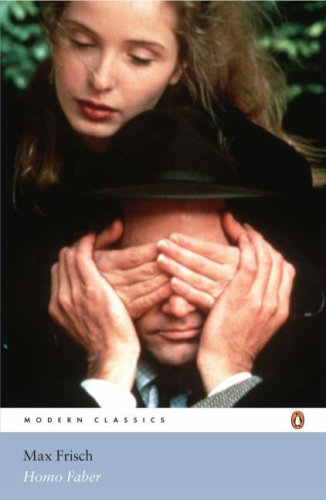 Homo Faber [Man the Maker] is a book about the realities of life, against a backdrop of plotted unreality: plane crashes, incestuous affairs [echoes of Oedipus Rex are loud and clear here], jungle explorations and other oddness. In the face of coincidences that it is unnecessary to believe in, Frisch tells his story of ordinary mystification in the face of life. The title character gradually disgards his practical masculinities in the face of mortality, his own and that of others. His life unravels, as he wanders back and forth in the face of meaninglessness and death. The scale of his errors and tragedy is simply the stage for the small and very human reflections of a human being confronting their own mortality and meaning.
Homo Faber [Man the Maker] is a book about the realities of life, against a backdrop of plotted unreality: plane crashes, incestuous affairs [echoes of Oedipus Rex are loud and clear here], jungle explorations and other oddness. In the face of coincidences that it is unnecessary to believe in, Frisch tells his story of ordinary mystification in the face of life. The title character gradually disgards his practical masculinities in the face of mortality, his own and that of others. His life unravels, as he wanders back and forth in the face of meaninglessness and death. The scale of his errors and tragedy is simply the stage for the small and very human reflections of a human being confronting their own mortality and meaning.The convolutions of plot are the disintegration of his carefully constructed reality, the collapse of his rationalist/technologist world view. You don't have to believe them, they are waystations in the journey Frisch takes you on.
It was published in 1957, so there's some wincing in the face of the roles/opinions of women of the time, but surprisingly little, I think because Frisch treats the central female characters as full human actors. There were some gems of reflection in here about gender relations and construction:
The man hears only himself, according to Hanna, therefore the life of a woman who wants to be understood by a man must inevitably be ruined. According to Hanna. The man sees himself as master of the world and the woman only as his mirror. The master is not compelled to learn the language of the oppressed; the woman is compelled, though it does her no good, to learn the language of the master, she merely learns a language that always puts her in the wrong. Hanna regretted having become a Ph.D. As long as God is a man, not a couple, the life of a woman, according to Hanna, is bound to remain as it is now, namely wretched, with woman as the proletarian of Creation, however smartly dressed.Which is essentialist, sure, but nevertheless, awesome!
This book has wit, beautiful prose, and a real visceral feel to it. It's modern, despite being nearly 60 years old. It is haunting, and will definitely stay with me.
On finishing this I bought two more of Frisch's books, I had to order hard copies as they aren't on Kindle, so I'm looking forward to their arrival!
This was an e-read on Kindle for iPad.
9/10

1 comment:
I've never heard of Max Frisch. How wonderful to discover a new to you author. I may have to see if I can find a copy of this one.
Post a Comment